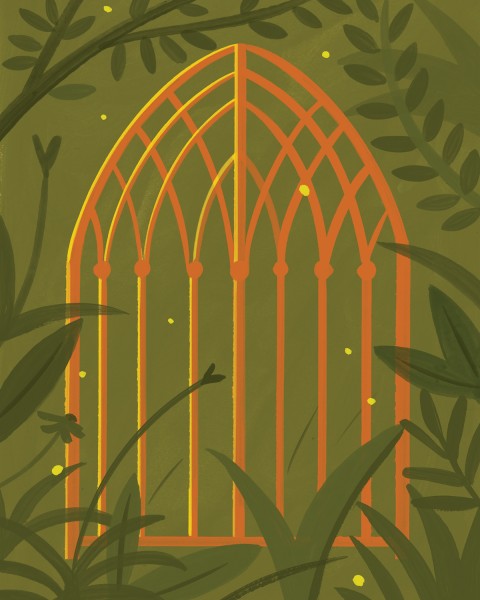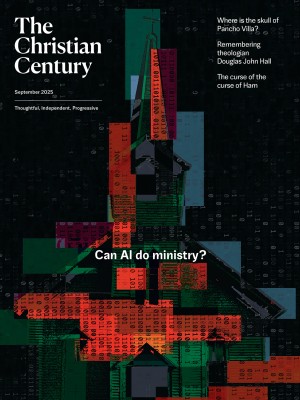The word outlasts the throne
Kings fall, tyrants pass, and hope endures in the prophets’ vision of God’s story.

Illustration by Tallulah Fontaine
Change over time is not just a truism for historians. It is a fact of life, no matter who we are. Nothing stays the same, all good things come to an end—for great athletes, for powerful rulers, for you and me.
It has always been the case that things change, strength gives way, passions attenuate. When it comes to this immutable fact of life, none of us is immune. The memory of watching greats like Serena Williams and Roger Federer in real time will inevitably fade in years to come. Video replays will not do justice to the passing of an era.
Read our latest issue or browse back issues.
A week after Muhammad Ali lost to Leon Spinks in 1978, Lance Morrow wrote in Time magazine: “It becomes a parable: those few athletes who are gifted with a certain magic become proof of the splendors that the body can achieve—the feats of grace, strength, speed, skill, stamina. But the athlete’s half-life is so short; his decline and failure become a model of the mortality in everyone.”
This rule of temporality also applies to Old Testament kings—though with less fanfare and more of a sense of relief, because so many of them have a remarkable knack for disappointing God and people. More often than not, they are corrupt tyrants who send men off to war, enslave women for domestic service, and hoard land and money for themselves—just as God said they would when warning about the danger of kings (1 Sam. 8:10–22). The only dependable fact about kings is that they will die and be replaced.
If scripture and history provide cautionary tales to anyone so foolish as to desire kingship, or to pine for the rule of kings, there is a spiritual lesson for all of us as well. Hoarding power and prosperity is not the path to getting what the heart desires—or what the world needs.
Underscoring this very point, the book of Jeremiah opens with a timeline of three kings under whose reigns the prophet labored—a progression marked by growing corruption and tyranny and culminating in the devastation of exile.
Without minimizing the tragic human toll, there remains a measure of good news, or at least a hopeful message. The phrase “this too shall pass” offers comfort to those suffering fear and uncertainty. Even the most ruthless kings pass away, and new worlds emerge after them.
Timefulness, as geologist Marcia Bjornerud explains in a 2018 interview with Princeton University Press’s blog, is “the habit of seeing things not merely as they are now, but also recognizing how they evolved—and will continue to evolve—over time.” It is the ability “to hold in the mind’s eye multiple past—and plausible future—iterations of the Earth.”
In the first chapter of Jeremiah, we encounter the timefulness of prophecy—in contrast to the timeline of kings. The prophets see time in a different way than most people do. Their words reflect a timeful wisdom, undistracted by present circumstances, that sees the interconnected nature of life. Opening our eyes to the prophets’ timefulness means that we resist seeing today apart from yesterday or tomorrow. What has been, what is, and what will be are all integrally connected, even if they appear chaotic, random, and meaningless.
I love this expansive vision of the world, where one moment in time never exists in isolation, where the way things are today need not be the way things must be tomorrow. The world is changing, and we can be active agents in that process. The more collective the effort, the more multitudes of people come together for a shared journey, the better.
During the prophetic ministry of Jeremiah, kings come and go, but the word of the Lord endures. As a mouthpiece for that word, Jeremiah outlasts the kings. He points to God’s commitment to make all things new. Yes, his message portends impending disaster, but not without offering a future restoration. For the prophets, death and destruction are never the final word. If there is plucking up and pulling down, there is also building and planting (1:10). The process of deconstructing and dismantling religion gone awry has its rightful place when there is a vision for the renewing, reconstituting work of faith.
Ordinary life includes many examples of this cycle of disorientation and reorientation, beautiful and mundane alike. Like many parents, I loved watching my boys build with Lego bricks. Somehow they are both truly indestructible and endlessly deconstructable. Sometimes, tearing apart a masterpiece that took painstaking days to build was even fun and delightful, because there was always confidence that the essence and infinite possibilities of Lego remained, no matter how many times they took their creations apart.
In fact, the process of taking apart and remaking is an essential part of the divine economy that makes human flourishing possible. Inasmuch as we are caught up in the process of history’s unfolding, we can be active agents in its shaping—because we are, as Jeremiah records, known in God’s eyes before we are formed (1:5).
On particularly bleak days, it is helpful for me to notice the timeline of kings but not dwell on it. Rulers come and go, and despite all of their bluster and bullying, they are not as powerful or as permanent as they like to think. Thankfully, the timeful word of prophets points to the passing of tiresome tyrants, the promise of new creation, and a world without end where all flourish. All of which leads me to ask: Who are the prophets speaking in our world today? What are they saying? And for those who have ears to hear, how might we listen and live?






